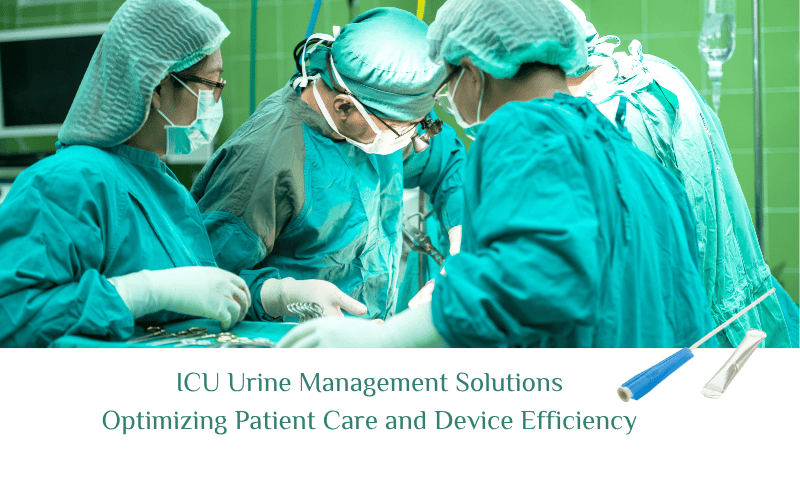TEl: +86-13148388090
Fax:+86-571-88616515
ICU Urine Management Solutions-Enhancing Patient Care & Device Efficiency
Author: admin / 2025-10-27Effective urine management in the Intensive Care Unit (ICU) is a critical component of patient care. ICU patients often require continuous monitoring, and improper urine management can lead to complications such as urinary tract infections, catheter blockages, or inaccurate fluid balance records. Hospitals and healthcare providers must implement comprehensive urine management strategies, combining best practices with high-quality medical devices. This guide explores ICU urine management solutions, emphasizing patient safety, efficiency, and the role of intermittent catheterization in patient-centered care.
1. Importance of ICU Urine Management
ICU patients are often critically ill and may require specialized urinary monitoring or intermittent catheterization (IC). Effective urine management has several key objectives:
- Preventing Urinary Tract Infections (UTIs): ICU patients are at higher risk of catheter-associated urinary tract infections (CAUTIs). Proper catheter selection, sterile insertion, and regular maintenance are essential to reduce infection rates.
- Accurate Fluid Balance Monitoring: Precise urine measurement helps clinicians monitor kidney function, detect fluid imbalances, and adjust treatment plans.
- Enhancing Patient Comfort and Safety: High-quality catheters, including hydrophilic intermittent catheters, reduce discomfort, prevent trauma, and maintain consistent urine drainage.
- Supporting Workflow Efficiency: Automated or smart urine management systems can reduce nursing workload, minimize errors, and provide real-time data for better clinical decision-making.

2. Best Practices for ICU Urine Management
1)Selecting the Right Catheter
ICU patients may require intermittent catheterization or other specialized catheters. Silicone or medical-grade PVC catheters are commonly used due to their durability and flexibility. Hydrophilic catheters provide pre-lubrication, reducing friction during insertion and enhancing patient comfort. Hospitals can partner with manufacturers to obtain catheters tailored to ICU needs, including specific lengths, diameters, and features suitable for IC.
2)Sterile Insertion and Maintenance
Follow strict aseptic techniques during catheter insertion. Gloves, masks, and sterile drapes should be used. Regular cleaning of the catheter insertion site prevents bacterial growth and reduces infection risk. Secure the catheter or collection system to avoid accidental dislodgement, which can compromise patient safety.
3)Urine Monitoring and Recording
Record urine output, color, and odor at regular intervals to detect early signs of complications. Smart ICU urine management systems can automate these measurements, providing alerts for unusual volumes or changes in urine characteristics.
4)Device Management and Catheter Replacement
Replace catheters according to clinical guidelines and product instructions, particularly for repeated intermittent catheterization. Proper disposal and adherence to sterile techniques are essential to prevent contamination.
3. Educational Significance
Proper ICU urine management and intermittent catheterization are not only clinical tasks but also educational opportunities for healthcare providers and caregivers. Training on IC technique, hygiene, and monitoring ensures safe, effective bladder management. Educated staff and informed patients experience fewer complications, better comfort, and improved adherence to care protocols.
4. OEM and Contract Manufacturing Solutions
For hospitals and healthcare providers seeking high-quality intermittent catheters, BEVER Medical offers OEM manufacturing solutions. Our services include:
- Custom Design: Hydrophilic catheters tailored to ICU patient needs, including length, diameter, and material selection.
- Quality Assurance: Products meet strict regulatory standards and carry CE and FDA certifications to ensure consistent performance and safety.
- Usage Instructions: Detailed guidance for safe intermittent catheterization, enhancing patient safety and staff confidence.
- Supply Stability: Reliable sourcing supports uninterrupted ICU operations and efficient workflow.
By leveraging OEM and contract manufacturing solutions, healthcare facilities can access customized hydrophilic intermittent catheters that optimize both patient care and operational efficiency.
5. Conclusion
ICU urine management requires a combination of professional nursing practices, safe intermittent catheterization, and high-quality medical devices. Key takeaways include:
- Follow strict sterile techniques and maintenance protocols to prevent infections.
- Select appropriate catheters, emphasizing hydrophilic intermittent catheters, to enhance patient comfort and ensure accurate urine monitoring.
- Consider OEM and contract manufacturing solutions for customized, reliable catheter systems.
By integrating these strategies, hospitals and ICUs can provide safer, more efficient, and patient-centered urine management, improving both clinical outcomes and operational workflow.



